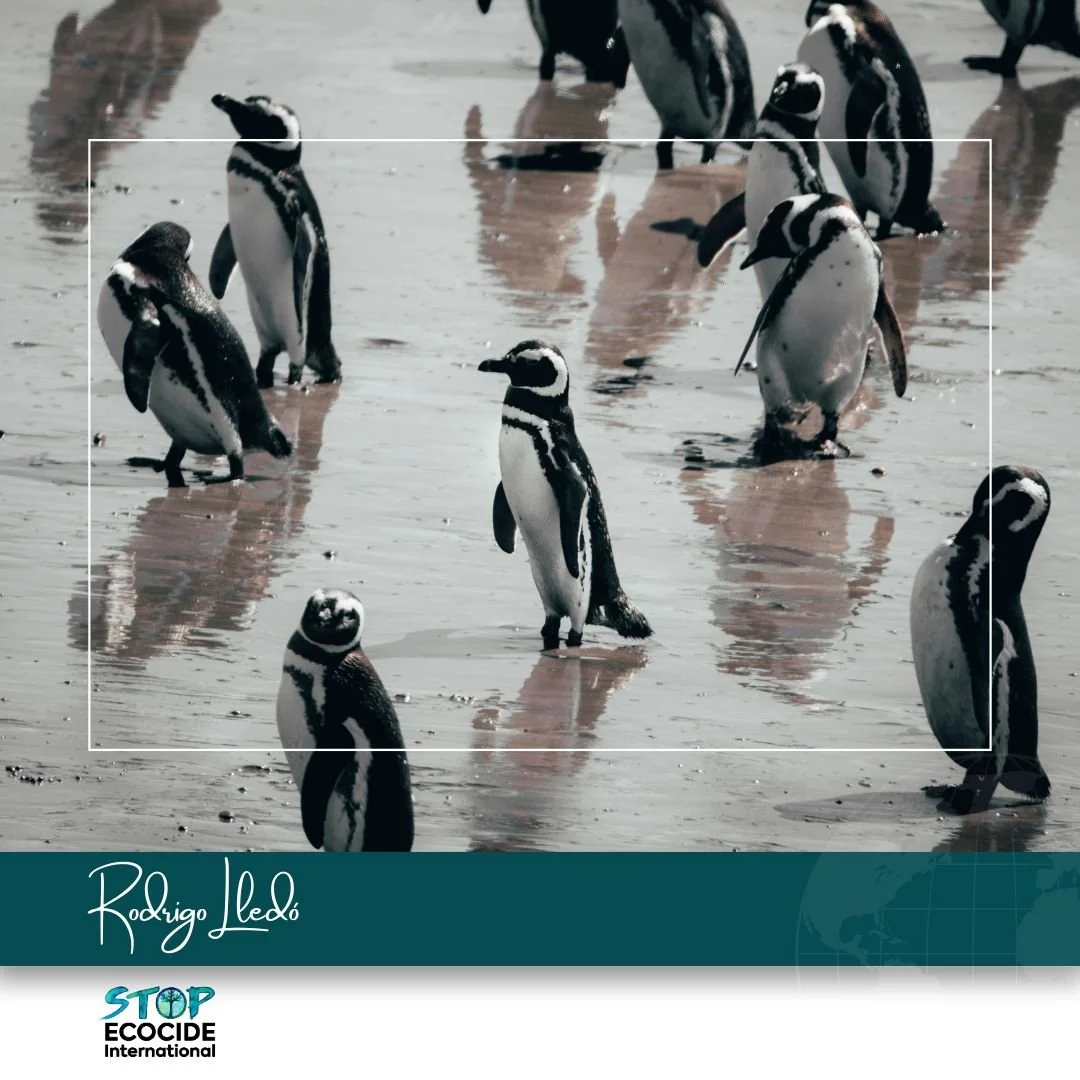Argentina: Massacre of Penguins Underscores Need for Ecocide Law
This article was first published in EcoNews.
Rodrigo Lledó is Americas Director at Stop Ecocide International. He is a lawyer and has a Master’s in Public Law and Constitutional Law, as well as a PhD in Law.
Punta Tombo, located 110 kilometres south of Rawson, in the province of Chubut, Argentina, is the largest continental nesting area for the Magellanic penguin (Spheniscus magellanicus). This species is extremely vulnerable as a result of both climate change, which has diminished its food supply, and direct human action. For this reason, Punta Tombo has been declared a Nature Protected Area and has been part of UNESCO's World Network of Biosphere Reserves since 2015.
The facts
Between 10 August and 4 December 2021, without prior environmental authorisation and disregarding local warnings, a ranch administrator deliberately ran a bulldozer over the area with the intention of building a road and erecting fences. They cleared the native flora and destroyed at least 175 nests and as many eggs, chicks and adult Magellanic penguins.
As soon as the news broke, government experts inspected the site, concluding that: ‘The opening of roads in itself had a strong impact on the ecosystem ... due to the destruction of the habitat where the nests are located.’ They also drew attention to the installation of ‘an electrified fence that prevented the free movement of wildlife.’ (See Judgment).
This brutal, unnecessary and unjustifiable act was brought before the courts by the Chubut Public Prosecutor's Office, followed by environmental organisations such as the Patagonia Natural Foundation, the Argentine Association of Environmental Lawyers and Greenpeace Argentina.
A Magellanic penguin at Punta Tombo. Credit: Don Faulkner/ Flickr.
The trial
In her indictment, Prosecutor Florencia Gómez argued that the area that was wrecked was: ‘... the core of the UNESCO Patagonia Azul Biosphere Reserve, also internationally designated as an Important Bird Area (IBA)’. The prosecutor described the damage to the environment as severe and irreversible, as the events took place in the middle of the reproductive cycle.
The court, presided over by Laura Martini and composed of Eve Ponce and Carlos Richeri, found itself in the position of having to classify these events as a criminal offence, even though none of the offences in the Penal Code seemed appropriate to cover the seriousness of the conduct. And this is where something truly extraordinary happened.
Ecocide
Judge Richeri stated: ‘As a judge, it is my responsibility to verify the classification of the facts under the law... However, I believe that this is a type of damage that, due to its severity, extent and duration, was unimaginable to those who drafted the law.’
The judge added: ‘One of the most widespread and accepted concepts of ecocide is that of “an unlawful act committed with the knowledge that there is a substantial likelihood that it will cause severe damage that is extensive or long-lasting to the environment”.’ The judge analysed each of the terms used in this definition and concluded that ‘... with all these elements, I can affirm that the aggravated damage caused by [the defendant] ... constitutes ecocide.’
Nevertheless, ecocide is not classified as a crime in Argentine law, and the judge therefore agreed with the other presiding judges on the legal classification proposed by the prosecution and environmental organisations. In the end, the defendant was convicted of the ‘continuous crime’ of ‘aggravated damage in conjunction with the offence of animal cruelty’. A few months later, the higher court upheld this verdict.
The bills
The case of the penguins of Punta Tombo was the main basis for the first ecocide bill to be introduced in Argentina, presented on 25 October 2024 by an MP from Chubut, Ana Clara Romero. Notably, the explanatory memorandum mentions the consensus definition of ecocide developed in 2021 by an Independent Expert Panel convened by the Stop Ecocide Foundation.
Subsequently, on 1 April 2025, Margarita Stolbizer, a member of parliament for the province of Buenos Aires, presented a comprehensive bill on environmental crimes, which includes a chapter entirely devoted to the crime of ecocide. More recently, on 19 June, the Chair of the Argentine Senate's Environment Committee, Edith Terenzi, presented an extensive bill on ‘Special Forms of Environmental Crime’, whose Article 1 states: that ‘the purpose of this law is to classify ecocide and special forms of environmental crime for their systematic incorporation into the National Criminal Code’.
A panel discussion in Argentina’s Congress between Dr. Miguel Ángel Asturias and representatives of Argentina’s three ecocide law proposals: Maria José Fa (Adviser to Senator Edith Terenzi), Congresswoman Margarita Stolbizer and Justa Roca (Adviser for Ana Clara Romero).
Technical aspects
Stop Ecocide International and the Association of Researchers in Environmental and Climate Criminal Law (AIDPAC) have provided consistent technical collaboration in the formulation of ecocide law proposals in Argentina. In particular, Professor Miguel Ángel Asturias, the director of AIDPAC, drafted a proposed ecocide law for Argentina in 2022, which has been essential reference material in the drafting of the bills currently under consideration in parliament.
Unfortunately, the law is rarely one step ahead of events; rather, it tends to be put in place when its bitter necessity has already been proven. While it is never too late to put in place environmental protection, in this case, the three bills have come too late for several serious environmental incidents, including the penguin massacre that continues to underscore the urgent need to criminalise ecocide in Argentina.



